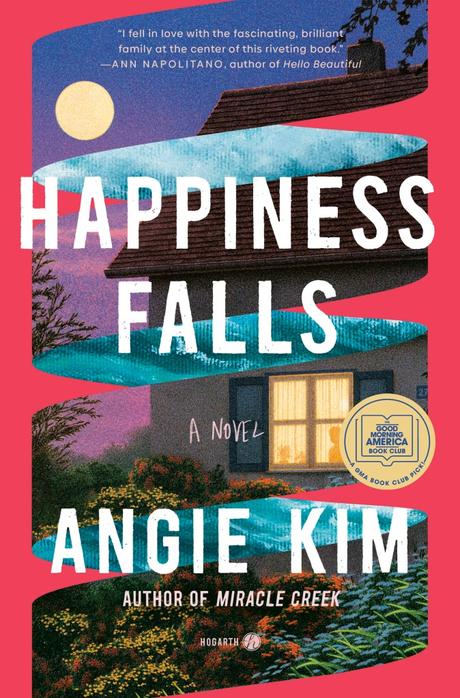If there’s a book I’ve recommended over and over again, it’s Miracle Creek by Angie Kim, so I was thrilled to receive an ARC of her new book. Despite its similar name, Happiness Falls is not a sequel. But it is similar in many ways. Once again, Kim weaves a complex mystery around interesting, sympathetic characters. And again, her focus is on family relationships and the unique needs of individuals on the autism spectrum.

The story begins in a Northern Virginia suburb when a father, Adam, takes his severely disabled teenage son Eugene out for their usual hike. The son returns, agitated but since he is unable to communicate, his sister, 20-year-old Mia, doesn’t notice that their father failed to return. The police have a few theories – could Eugene have had a tantrum and unintentionally caused his father’s death? Or did Dad abandon his family for another woman?
Mia soon finds out there are things she didn’t know about their father and his relationship with Eugene. She finds herself recounting every conversation her family had in recent days, to try and figure out what happened to her father, while balancing the need to protect her brother. I’ll try to reveal as little as possible, since this book is worth experiencing for yourself.
To say this is a “literary mystery” is an oversimplification. As with Miracle Creek, it’s combines legal thriller with philosophy, science, and psychology. Kim looks at not only the complicated needs of this family but also the shifting motivations of advocates and police. The deeper themes that run throughout the book focus on how we communicate, and our biased perceptions of people who can’t speak clearly. For example, we often assume that people learning English are less intelligent, when in fact they may have advanced degrees and are fluent in multiple languages. Or we assume that someone with a speech disability must also be cognitively impaired.
Additionally, Kim explores the concept of happiness and how all happiness is relative. If we get used to something, our happiness with it decreases, and if we are expecting something negative we will be much happier with even a slightly positive outcome. Mia’s cynicism is contrasted with her twin brother’s optimism. This aspect of the story may have been a bit over-explained, since it seems fairly straightforward, but I was intrigued by some of the studies Kim shares about people’s perceptions of happiness.
A large part of the story focuses on experimental therapies to help people with speech and movement disabilities to express themselves. As I’m very interested in education and communication, I found this fascinating and I appreciated how it was worked into the story.
I enjoyed Mia’s strong personality, which is reflected in the tone and even format of the narration (Mia naturally thinks in footnotes, for example). So many novels hop from narrator to narrator; Kim may have considered giving each family member some of the narration, but I’m glad she didn’t.
This is a hard-to-put-down read that combines many elements I enjoyed, and I’m still thinking about the way the story was resolved. There are some pacing issues; readers might find there is too much information in some places which slows down the story. If you’re looking for a “popcorn thriller” this might not be for you. But if you’re looking for a mystery that’s a family drama, with complicated issues and well-developed characters, I highly recommend this one (and Miracle Creek as well).
Much thanks to NetGalley and publisher Random House for an advanced review copy of this book, which was published September 5, 2023.

